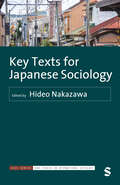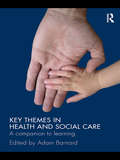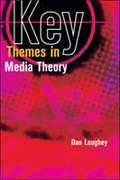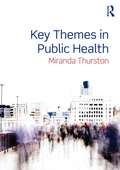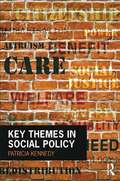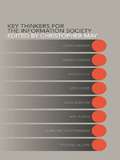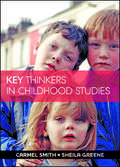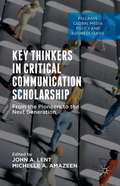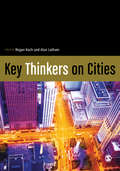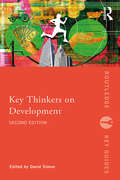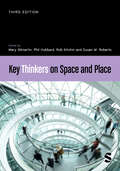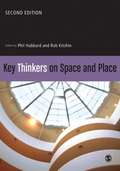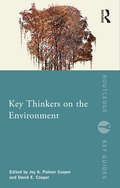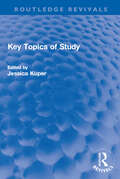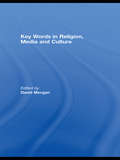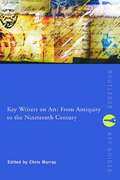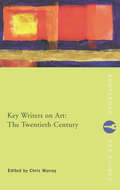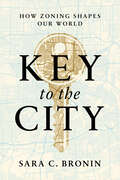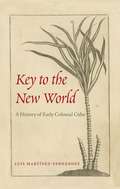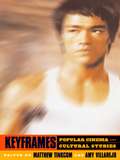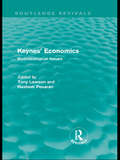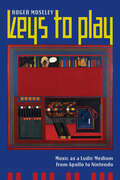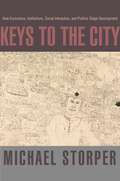- Table View
- List View
Key Texts for Japanese Sociology (SAGE Studies in International Sociology)
by Hideo NakazawaThough rich, diverse, unique and engaging, Japan′s sociological outputs have been internationally underrepresented. In its thoughtful translation and curation of key Japanese sociological texts, this book redresses this imbalance and treads exciting new ground. Comprising 17 chapters spanning 7 decades, this text introduces you to fundamental themes, from classical studies in post-war Japan to contemporary sociological issues like migration politics, social mobility and gender-based violence. Key Texts for Japanese Sociology is an original, much-needed resource, empowering a foundational, confident understanding of the national, regional and local traditions of Japanese sociology from the latter half of the last century to today.
Key Themes in Health and Social Care: A Companion to Learning
by Adam BarnardKey Themes in Health and Social Care is a learning resource for students in health and social care. It provides an overview of foundational issues and core themes in the field and introduces key areas of debate, moving from an introductory level to in-depth discussion as the book progresses. Divided into three parts: the first part sets the scene, addressing introductory psychology and sociology, social policy, equality and diversity, skills for practice, and working with people the second part considers key themes such as the contribution of philosophy and politics; criminal justice; management of services; the relationship between place and wellbeing; research in health and social care; theories of counselling; housing and the built environment the third part looks at discrete areas of practice such as mental health; substance abuse, protection work; health promotion; disability studies; working with men; child welfare and public responsibility. Each chapter begins with an outline of the content and learning outcomes and includes reflective exercises to allow students to reflect on what they have read, review their learning and consolidate their understanding. Time-pressed readers wanting to ‘dip into’ the book for relevant areas can do so but, read from cover to cover, the book provides a comprehensive introduction to the key areas of contemporary health and social care practice. It will be particularly helpful for students undertaking health and social care undergraduate and foundation degrees.
Key Themes in Media Theory
by Dan LaugheyKey Themes in Media Theory provides a thorough and critical introduction to the key theories of media studies. It is unique in bringing together different schools of media theory into a single, comprehensive text, examining in depth the ideas of key media theorists such as Lasswell, McLuhan, Hall, Williams, Barthes, Adorno, Baudrillard and Bourdieu. Using up-to-date case studies the book embraces media in their everyday cultural forms – music, internet, film, television, radio, newspapers and magazines – to enable a clearer view of the ‘big picture’ of media theory. In ten succinct chapters Dan Laughey discusses a broad range of themes, issues and perspectives that inform our contemporary understanding of media production and consumption. With images and diagrams to illustrate chapter themes, examples that apply media theory to media practice, recommended reading at the end of every chapter, and a useful glossary of key terms, this book is the definitive guide to understanding media theory.
Key Themes in Public Health
by Miranda Thurston‘The growth of public health courses aimed at undergraduates has created a new need for textbooks that are appropriate and stimulating. Miranda Thurston has succeeded in producing something which strikes the right note. It is wide ranging in scope without being superficial and is accessible to the young learner. It is a sort of 'Wiki'. Just what the aspiring public health practitioner ordered.’ – Professor John R. Ashton C.B.E., President of the UK Faculty of Public Health. Key Themes in Public Health comprises a series of introductory essays exploring key themes and concepts in public health. Ranging from political and economic concern with improving population health and reducing health inequalities, to debates about how to protect populations from new health threats, as well as a concern with individual responsibility for lifestyles and behaviour, the themes discussed include: determinants of health, globalisation, evidence, climate change, ethics, development, poverty, risk and population. Presenting provocative ways of thinking about key ideas in a concise fashion, each essay provides a basic grounding in the relevant theme as well as a departure point for further study by: Defining the theme in an accessible way Placing each idea in its particular social, political, economic and historical context Illustrating its application and significance for public health Identifying and exploring issues surrounding each of the themes This text provides an accessible overview for students new to public health who want to get to grips with the full range and complexity of this diverse and multidisciplinary field.
Key Themes in Social Policy
by Patricia KennedyKey Themes in Social Policy provides an accessible and authoritative introduction to the key concepts used in social policy, from autonomy to wellbeing. With over 100 ideas discussed, this is a comprehensive student guide and is designed to help readers to gain a deeper understanding of major debates and issues. Each entry: explains the origin of the word discusses its relationship to the social sciences describes its relevance to social policy and how widespread its use is outlines some of the key thinkers and research on the topic and gives suggestions for further reading. Making it easy to understand and use the most important ideas in the area, this is an essential companion for all students taking social policy courses.
Key Thinkers for the Information Society: Volume One
by Christopher MayKey Thinkers for the Information Society provides an introduction to some important social theorists whose work has considerable relevance to today's 'brave new world' of information and communication technologies. With the aim of widening current perspectives on the information society, each contributor introduces a particular theorist and discusses the way in which their insights can be reintroduced into debates regarding the social, political and cultural impact of ICTs. Theorists presented in Volume 1 include some well-known and some less well-known figures: Walter Benjamin; Murray Edeleman; Jacques Ellul; Harold Innes; Lewis Mumford; Karl Polanyi; Eric Elmer Scattachneider and Raymond Williams. Each has something fresh and pertinent to say and taken as a whole this volume provides an exciting new resource for contemporary studies.
Key Thinkers in Childhood Studies
by Carmel Smith Sheila GreeneKey Thinkers in Childhood Studies presents the contrasting perspectives of some of the leading figures involved in shaping the field of Childhood Studies over the last 30 years. Using in-depth interviews, twenty-two high profile pioneers, who represent a range of disciplines and nationalities, share personal and unpublished accounts of their work and careers. They reflect upon the significant changes that have taken place in the study of children and childhood, discuss the evolution of ideas underpinning the field, examine current tensions and dilemmas and explore challenges for the future. This book fills a gap by offering important insights into researchers’ experiences in Childhood Studies and their ideas about the central issues confronting the field. It will be of interest to students, practitioners and experienced academics from all disciplinary backgrounds who are seeking to contextualise, understand and advance our understanding of childhood, children and youth.
Key Thinkers in Critical Communication Scholarship: From The Pioneers To The Next Generation (Palgrave Global Media Policy and Business)
by Michelle Amazeen John LentThe personal anecdotes and candid reflections on the lives and work of these important critical scholars, and their predictions on the future of the field, make this book a valuable resource for scholars and students of communication, media studies, political economy, political science, and those interested in critical theoretical approaches.
Key Thinkers on Cities
by Alan Latham Regan KochKey Thinkers on Cities provides an engaging introduction to the dynamic intellectual field of urban studies. It profiles the work of 40 innovative thinkers who represent the broad reach of contemporary urban scholarship and whose ideas have shaped the way cities around the world are understood, researched, debated and acted upon. Providing a synoptic overview that spans a wide range of academic and professional disciplines, theoretical perspectives and methodological approaches, the entry for each key thinker comprises: A succinct introduction and overview Intellectual biography and research focus An explication of key ideas Contributions to urban studies The book offers a fresh look at well-known thinkers who have been foundational to urban scholarship, including Jane Jacobs, Henri Lefebvre, Manuel Castells and David Harvey. It also incorporates those who have helped to bring a concern for cities to more widespread audiences, such as Jan Gehl, Mike Davis and Enrique Peñalosa. Notably, the book also includes a range of thinkers who have more recently begun to shape the study of cities through engagements with art, architecture, computer modelling, ethnography, public health, post-colonial theory and more. With an introduction that provides a mapping of the current transdisciplinary field, and individual entries by those currently involved in cutting edge urban research in the Global North and South, this book promises to be an essential text for anyone interested in the study of cities and urban life. It will be of use to those in the fields of anthropology, economics, geography, sociology and urban planning.
Key Thinkers on Development (Routledge Key Guides)
by David SimonSince its publication in 2006 as Fifty Key Thinkers on Development, this invaluable reference has established itself as the leading biographical handbook in its field, providing a concise and accessible introduction to the lives and key contributions of development thinkers from across the ideological and disciplinary spectrum. This substantially expanded and fully updated second edition in the relaunched series without the numerical constraint includes an additional 24 essays, filling in many gaps in the original selection, greatly improving the gender balance and diversifying coverage to reflect the evolving landscape of development in theory, policy and practice. It presents a unique guide to the lives, ideas and practices of leading contributors to the contested terrain of development studies and development policy and practice. Its thoughtful essays reflect the diversity of development in theory, policy and practice across time, space, disciplines and communities of practice. Accordingly, it challenges Western-centrism, Orientalism and the like, while also demonstrating the enduring appeal of "development" in different guises. David Simon has assembled a highly authoritative team of contributors from different backgrounds, regional settings and disciplines to reflect on the lives and contributions of leading authorities on development from around the world. These include: Modernisers like Kindleberger, Perroux and Rostow Dependencistas such as Frank, Furtado, Cardoso and Amin Progressives and critical modernists like Hirschman, Prebisch, Helleiner Sen, Streeten and Wang Political leaders enunciating radical alternative visions of development, such as Mao, Nkrumah and Nyerere Progenitors of religiously or spiritually inspired development, such as Gandhi, Ariyaratne and Vivekananda Development–environment thinkers like Agarwal, Blaikie, Brookfield, Ostrom and Sachs International institution builders like Singer, Hammarsköld, Kaul and Ul Haq Anti- and post-development thinkers and activists like Escobar, Ghosh, Quijano and Roy Key Thinkers on Development is therefore the essential handbook on the world’s most influential development thinkers and an invaluable guide for students of development and sustainability, policy-makers and practitioners seeking an accessible overview of this diverse field and its leading voices.
Key Thinkers on Space and Place
by Mary Gilmartin Phil Hubbard Rob Kitchin Susan M. RobertsSpace and place are at the heart of how geographers and sociologists think. This updated edition of the essential undergraduate text will introduce you to the most influential thinkers in the tradition of social theory, with a new focus on the past fifty years. This book is designed to engage with theoretical debates in human geography through the individuals who have made the most significant contributions to this field. This will show you how ideas are shaped by contexts, and how those ideas in turn effect change. This book shows how theoretical understandings evolve, shift and change. It also highlights the connections between different thinkers, whose ideas are developed in collaboration with or in reaction to others. Spatial thought is never developed in a vacuum, but is always constructed by individuals and groups of people located in particular institutional and social structures, with their own sets of personal and political beliefs. The biographical approach of this book reveals how individual thinkers draw on a rich legacy of ideas from past and contemporary generations. With increased coverage of international and female thinkers, as well as those who work against Eurocentric notions of space and place, this book reveals the exciting reorientation of Geography towards new ideas and methods in the last decade. Each entry contextualises its subject within on-going (inter)disciplinary debates and important political moments, as well as highlighting connections between different thinkers. Together the chapters uncover the rich and diverse evolution of social theory, equipping you with the foundational ideas of geographical thought. Each entry offers the following components: i) a short biography ii) an explanation of ideas iii) an exploration of how their ideas have been used and critiqued iv) a selective bibliography of key publications (and key publications which review or critique)
Key Thinkers on Space and Place
by Mary Gilmartin Phil Hubbard Rob Kitchin Susan M. RobertsSpace and place are at the heart of how geographers and sociologists think. This updated edition of the essential undergraduate text will introduce you to the most influential thinkers in the tradition of social theory, with a new focus on the past fifty years. This book is designed to engage with theoretical debates in human geography through the individuals who have made the most significant contributions to this field. This will show you how ideas are shaped by contexts, and how those ideas in turn effect change. This book shows how theoretical understandings evolve, shift and change. It also highlights the connections between different thinkers, whose ideas are developed in collaboration with or in reaction to others. Spatial thought is never developed in a vacuum, but is always constructed by individuals and groups of people located in particular institutional and social structures, with their own sets of personal and political beliefs. The biographical approach of this book reveals how individual thinkers draw on a rich legacy of ideas from past and contemporary generations. With increased coverage of international and female thinkers, as well as those who work against Eurocentric notions of space and place, this book reveals the exciting reorientation of Geography towards new ideas and methods in the last decade. Each entry contextualises its subject within on-going (inter)disciplinary debates and important political moments, as well as highlighting connections between different thinkers. Together the chapters uncover the rich and diverse evolution of social theory, equipping you with the foundational ideas of geographical thought. Each entry offers the following components: i) a short biography ii) an explanation of ideas iii) an exploration of how their ideas have been used and critiqued iv) a selective bibliography of key publications (and key publications which review or critique)
Key Thinkers on Space and Place
by Phil Hubbard Rob Kitchin`It is a safe bet that Key Thinkers will emerge as something of a 'hit' within the undergraduate community and will rise to prominance as a 'must buy' - Environment and Planning `Key Thinkers on Space and Place is an engagingly written, well-researched and very accessible book. It will surely prove an invaluable tool for students, whom I would strongly encourage to purchase this edited collection as one of the best guides to recent geographical thought' -Claudio Minca, University of Newcastle `Key Thinkers is the best encyclopedic tool for human geographers since the Dictionary of Human Geography. It takes into its orbit discussions of the lives and work of the last three decades' major thinkers on space and place. It is hugely useful for students who want an easy way to access the roots of where some major themes and debates in contemporary geography. It is organized so that each chapter details the scholar's biography, their contribution to spatial and place-based theory and the controversies that arise through their work' - Stuart Aitken, San Diego State University Key Thinkers on Space and Place is a comprehensive guide to the latest work on space. Each entry is a short interpretative essay of 2,500 words, outlining the contributions made by the key theorists, and comprises: · a concise biography, indicating disciplinary background, career trajectory and collaboration with others · an outline of the key theoretical, conceptual and methodological ideas each has introduced to human geography · an explanation of the reaction to, and uptake of, how these ideas has changed and evolved over time · an explanation of how these theories have been used and critiqued by human geographers · a selective bibliography of each thinker's key publications (and key secondary publications) The text is introduced by a contextual essay which outlines in general terms the shifting ways in which space and place have been theorised and which explains how Key Thinkers on Space and Place can be used. A glossary that defines key traditions, with cross-links to key theorists and a timeline of key article/book publication date is also included.
Key Thinkers on the Environment (Routledge Key Guides)
by David E. Cooper Joy A. Palmer CooperKey Thinkers on the Environment is a unique guide to environmental thinking through the ages. Joy A. Palmer Cooper and David E. Cooper, themselves distinguished authors on environmental matters, have assembled a team of expert contributors to summarize and analyse the thinking of diverse and stimulating figures from around the world and from ancient times to the present day. Among those included are: philosophers such as Rousseau, Kant, Spinoza and Heidegger activists such as Chico Mendes and Wangari Maathai literary giants such as Virgil, Goethe and Wordsworth major religious and spiritual figures such as Buddha and St Francis of Assissi eminent scientists such as Darwin, Lovelock and E.O. Wilson. Lucid, scholarly and informative, the essays contained within this volume offer a fascinating overview of humankind’s view and understanding of the natural world.
Key Topics in Sociolinguistics: Language Maintenance and Shift
by Anne PauwelsWhat motivates some linguistic minorities to maintain their language? Why do others shift away from it rather quickly? Are there specific conditions - environmental or personal - influencing these dynamics? What can families and communities do to pass on their 'threatened' language to the next generation? These and related questions are investigated in detail in Language Maintenance and Shift. In this fascinating book, Anne Pauwels analyses the patterns of language use exhibited by individuals and groups living in multilingual societies, and explores their efforts to maintain their heritage or minority language. She explores the various methods used to analyse language maintenance, from linguistic demography to linguistic biography, and offers guidance on how to research the language patterns and practices of linguistic minorities around the world.
Key Topics of Study (Routledge Revivals)
by Jessica KuperFirst published in 1987, Key Topics of Study gives an updated overview of the various disciplines and areas of study which go to make up the social sciences today. The essays deal expertly with the various branches of the social sciences, from anthropology to Women’s Studies, and include a useful bibliography for each topic. All the topics have been described succinctly and are comprehensible even to a casual reader. The book highlights the interdisciplinary nature of the social sciences and outlines the foundational arguments of various disciplines. This reference book can be read by everyone but will be particularly handy for students of the social sciences.
Key Words in Religion, Media and Culture
by David Morgan'From The Passion of the Christ to the presumed 'clash of civilizations', religion's role in culture is increasingly contested and mediated. Key Words in Religion, Media, and Culture is a welcome and interdisciplinary contribution that maps the territory for those who aim to make sense of it all. Highlighting the important concepts guiding state-of-the-art research into religion, media, and culture, this book is bound to become an important and frequently consulted resource among scholars both seasoned and new to the field.' –Lynn Schofield Clark 'David Morgan has assembled here a fine team of scholars to prove beyond a doubt that the intersections of religion, media, and culture constitute one of the most stimulating fields of inquiry around today...This highly useful and theoretically sophisticated text will likely assume 'ritual' status in this emergent field.' – Rosalind I. J. Hackett, University of Tennessee, US 'This volume is a major intervention in the literature on religion, media and culture. Drawing together leading international scholars, it offers a conceptual map of the field to which students, teachers and researchers will refer for many years to come. The publication of Key Words in Religion, Media and Culture is a significant moment in the formation of this area of study, and sets a standard for cross-disciplinary collaboration and theoretical and methodological sophistication for future work in this area to follow.' – Gordon Lynch, Birkbeck College, University of London, UK 'This book offers a range of refreshing essays on the relationships between media and religion. Its selected keywords open doors to understanding contemporary society. The cultural perspectives on mediation and religious practices give some illuminating and surprising analyses.' – Knut Lundby, University of Oslo, Norway
Key Writers on Art: From Antiquity to the Nineteenth Century (Routledge Key Guides)
by Chris MurrayKey Writers on Art: From Antiquity to the Nineteenth Century offers a unique and authoritative guide to theories of art from Ancient Greece to the end of the Victorian era, written by an international panel of expert contributors. Arranged chronologically to provide an historical framework, the 43 entries analyze the ideas of key philosophers, historians, art historians, art critics, artists and social scientists, including Plato, Aquinas, Alberti, Michelangelo, de Piles, Burke, Schiller, Winckelmann, Kant, Hegel, Burckhardt, Marx, Tolstoy, Taine, Baudelaire, Nietzsche, Ruskin, Pater, Wölfflin and Riegl.Each entry includes:* a critical essay* a short biography* a bibliography listing both primary and secondary textsUnique in its range and accessibly written, this book, together with its companion volume Key Writers on Art: The Twentieth Century, provides an invaluable guide for students as well as general readers with an interest in art history, aesthetics and visual culture.
Key Writers on Art: The Twentieth Century (Routledge Key Guides)
by Chris MurrayKey Writers on Art: The Twentieth Century offers a unique and authoritative guide to modern responses to art. Featuring 48 essays on the most important twentieth century writers and thinkers and written by an international panel of expert contributors, it introduces readers to key approaches and analytical tools used in the study of contemporary art. It discusses writers such as Adorno, Barthes, Benjamin, Freud, Greenberg, Heuser, Kristeva, Merleau-Ponty, Pollock, Read and Sontag.
Key to the City: How Zoning Shapes Our World
by Sara C. BroninAn eye-opening exploration of one of the little-known levers that controls our world—zoning codes—and a call-to-arms for using them to improve American society at every level. Zoning codes dictate how and where we can build housing, factories, restaurants, and parks. They limit how tall buildings can be and where trees can be planted. They have become the most significant regulatory power of local government, ultimately determining how we experience our cities. Yet zoning remains invisible. In Key to the City, legal scholar and architect Sara C. Bronin examines how zoning became such a prevailing force and reveals its impact—and its potential for good. Outdated zoning codes have maintained racial segregation, prioritized cars over people, and enabled great ecological harm. But, as Bronin argues, once we recognize the power of zoning, we can harness it to create the communities we desire, and deserve. Drawing on her own experience leading the overhaul of Hartford’s zoning code and exploring the efforts of activists and city planners across the country, Bronin shows how new codes are reshaping our cities—from Baltimore to Chicago, Las Vegas to Minneapolis, and beyond. In Boston, a law fought for by a passionate group of organizers, farmers, and beekeepers is transforming the city into a haven for urban farming. In Tucson, zoning codes are mitigating the impacts of climate change and drought-proofing neighborhoods in peril. In Delray Beach, Florida, a new code aims to capture and maintain the town’s colorful spirit through its architecture. With clarity and insight, Bronin demystifies the power of an inscrutable organizing force in our lives and invites us to see zoning as a revolutionary vehicle for change. In Key to the City, she puts forward a practical and energizing vision for how we can reimagine our communities.
Key to the New World: A History of Early Colonial Cuba
by Luis Martínez-FernándezFlorida Book Awards, Bronze Medal for General Nonfiction Scholarly and popular attention tends to focus heavily on Cuba’s recent history. Key to the New World is the first comprehensive history of early colonial Cuba written in English, and fills the gap in our knowledge of the island before 1700.
Keyframes: Popular Cinema and Cultural Studies
by Matthew Tinkcom Amy VillarejoKeyframes introduces the study of popular cinema of Hollywood and beyond and responds to the transformative effect of cultural studies on film studies.The contributors rethink contemporary film culture using ideas and concerns from feminism, queer theory, 'race' studies, critiques of nationalism, colonialism and post-colonialism, the cultural economies of fandom, spectator theory, and Marxism. Combining a film studies focus on the film industry, production and technology with a cultural studies analysis of consumption and audiences, Keframes demonstrates the breadth of approaches now available for understanding popular cinema. Subjects addressed include:* Studying Ripley and the 'Alien' films* Pedagogy and Political Correctness in Martial Arts cinema* Judy Garland fandom on the net* Stardom and serial fantasies: Thomas Harris's 'Hannibal'* Tom Hanks and the globalization of stars* Queer Bollywood* Jackie Chan and the Black connection* '12 Monkeys', postmodernism and urban space.
Keynes' Economics: Methodological Issues (Routledge Revivals)
by Tony Lawson and Hashem PesaranFirst published in 1985, this title includes contributions from leading economists and addresses many seminal aspects of Keynes' work and methods. This revival will be of particular interest to lecturers and advanced students of economics.
Keys to Play: Music as a Ludic Medium from Apollo to Nintendo
by Roger MoseleyA free ebook version of this title is available through Luminos, University of California Press’s Open Access publishing program for monographs. Visit www.luminosoa.org to learn more. How do keyboards make music playable? Drawing on theories of media, systems, and cultural techniques, Keys to Play spans Greek myth and contemporary Japanese digital games to chart a genealogy of musical play and its animation via improvisation, performance, and recreation. As a paradigmatic digital interface, the keyboard forms a field of play on which the book’s diverse objects of inquiry—from clavichords to PCs and eighteenth-century musical dice games to the latest rhythm-action titles—enter into analogical relations. Remapping the keyboard’s topography by way of Mozart and Super Mario, who head an expansive cast of historical and virtual actors, Keys to Play invites readers to unlock ludic dimensions of music that are at once old and new.
Keys to the City: How Economics, Institutions, Social Interaction, and Politics Shape Development
by Michael StorperWhy do some cities grow economically while others decline? Why do some show sustained economic performance while others cycle up and down? In Keys to the City, Michael Storper, one of the world's leading economic geographers, looks at why we should consider economic development issues within a regional context--at the level of the city-region--and why city economies develop unequally. Storper identifies four contexts that shape urban economic development: economic, institutional, innovational and interactional, and political. The book explores how these contexts operate and how they interact, leading to developmental success in some regions and failure in others. Demonstrating that the global economy is increasingly driven by its major cities, the keys to the city are the keys to global development. In his conclusion, Storper specifies eight rules of economic development targeted at policymakers. Keys to the City explains why economists, sociologists, and political scientists should take geography seriously.
